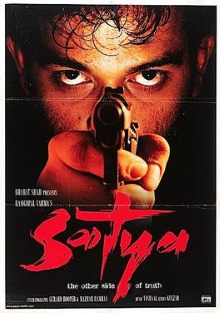
These epic length Indians films keep disappointing even as I keep giving them a chance since I’m reluctant to completely shut out the output of a huge part of the global film industry. This one is said to be one of the best examples of Indian cinema and is particularly influential in its gangster genre. Unfortunately it is once again a disappointment.
Satya, an orphan of unknown provenance, arrives in Mumbai in search of better prospects. He accept a lowly job as a waiter but accidentally offends a local gangster. Rather than submit however, he fights back against the goons and is thrown into jail. There he meets another gangster Bhiku Mhatre who takes a liking to Satya’s fearlessness and refusal to back down from a fight. Bhiku arranges for Satya to be released early, recruits him into his gang and even arranges for him to get revenge on the gangster who wronged him. In return, Satya proves to be a valuable asset in gun battles against other gangs. He advises Bhiku to aggressively go after another rival mobster Guru Narayan who has attacked them first even though Bhiku’s political patron has ordered them not to. Meanwhile Satya romances a sweet girl who aspires to be a singer but keeps the fact that he is a criminal a secret from her.
While there’s a satisfying grittiness in this film, I didn’t find this to be anything special. Indeed I believe that it stood out at the time of its release precisely for how archetypal it is. With no family background and no stated place of origin, the character of Satya could be anyone. His romance with the innocent singer and dutiful daughter Vidya is as standard as you can get with all the usual song and dance montages. Plus of course his relationship with Bhiku is exactly like blood brothers out of a Hong Kong triads film. As everything is at least competently executed, I suppose that there is something very reassuring in how it all fits together in a familiar way. As usual the film goes on for far too long and there are way too many of those song and dance montages. The only really interesting one to me is the very first song scene in which the gangsters pal around with some Rastafarian vibes. The rest are so generic that I wanted them to be over as soon as possible.
Perhaps more interesting than the film itself is what it says about gangsters in India. Clearly it has no hesitation about portraying politicians and the police in a bad light and appears to condone, at least to some extent, that the police is justified in taking extreme and illegal measures to dispatch criminals. Director Ram Gopal Varma does take pains to claim that the film is not meant to glorify gangsters, yet the narrative does make them out to be the best of a bad lot. Even if the director is being sincere in wanting criminals to be cognizant of the harm that they cause, the impression he leaves here is that Indian society is so unfair and so crime-ridden that the only way for an ordinary person to rise up is to break the law themselves. At the same time, he takes care to depict the close camaraderie and personal loyalties between the members of the gang. No wonder it’s hard to dispel doubts that the director is sympathetic towards the gangsters especially when he doesn’t shoot scenes of the families of the victims they kill grieving for them.
Satya isn’t a terrible film but it is a fairly run of the mill gangster film and even the action scenes nothing are remarkable. I even laughed at how the stoic and serious male lead J. D. Chakravarthy has a hard time trying to avoid being awkward in the song and dance scenes. As it’s outclassed in every respect by Gangs of Wasseypur, I would far prefer to recommend that over this one even if it is much longer.